63 Nayanmargal
- Adipattha Nayanar-அதிபத்த நாயனார்
- Aiyadigal Kadavarkon Nayanar-ஐயடிகள் காடவர்கோன் நாயனார்
- Amaraneedi Nayanar-அமர்நீதி நாயனார்
- Anaya Nayanar-ஆனாய நாயனார்
- Appuddi Nayanar-அப்பூதி அடிகள் நாயனார்
- Arivattaya Nayanar-அரிவாள் தாய நாயனார்
- Chandesvara Nayanar-சண்டேசுவர நாயனார்
- Cheraman Perumal Nayanar-செராமான் பெருமாள் நாயனார்
- Dandi Adigal Nayanar-தண்டியடிகள் நாயனார்
- Enadinatha Nayanar-ஏனாதிநாத நாயனார்
- Eripatha Nayanar-எறிபத்த நாயனார்
- Eyarkon Kalikama Nayanar-ஏயர்கோன் கலிக்காம நாயனார்
- Gananatha Nayanar-கணநாத நாயனார்
- Idangazhi Nayanar-இடங்கழி நாயனார்
- Ilayankudi Mara Nayanar-இளையான்குடி மாறநாயனார்
- Isaijnaniyar-இசை ஞானியார்
- Iyarpahai Nayanar-இயற்பகை நாயனார்
- Kalia Nayanar-கலிய நாயனார்
- Kalikamba Nayanar-கலிக்கம்ப நாயனார்
- Kanampulla Nayanar-கணம்புல்ல நாயனார்
- Kannappa Nayanar-கண்ணப்ப நாயனார்
- Karaikal Ammaiyar-காரைக்கால் அம்மையார்
- Kari Nayanar-காரி நாயனார்
- Kazharsinga Nayanar-கழற்சிங்க நாயனார்
- Kochengat Chola Nayanar-கோச்செங்கட் சோழ நாயனார்
- Kootruva Nayanar-கூற்றுவ நாயனார்
- Kotpuli Nayanar-கோட்புலி நாயனார்
- Kulacchirai Nayanar-குலச்சிறை நாயனார்
- Kungiliya Kalaya Nayanar-குங்குலியக் கலய நாயனார்
- Maiporul Nayanar-மெய்ப்பொருள் நாயனார்
- Manakanchara Nayanar-மானக்கஞ்சாற நாயனார்
- Mangayarkarasiyar-மங்கையர்க்கரசியார்
- Munaiyaduvar Nayanar-முனையடுவார் நாயனார்
- Murkha Nayanar-மூர்க்க நாயனார்
- Murthi Nayanar-மூர்த்தி நாயனார்
- Muruga Nayanar-முருக நாயனார்
- Nami Nandi Adigal-நமிநந்தியடிகள் நாயனார்
- Narasinga Muniyaraiyar-நரசிங்க முனையரைய நாயனார்
- Nesa Nayanar-நேச நாயனார்
- Ninra Seer Nedumara Nayanar-நின்றசீர் நெடுமாற நாயனார்
- Perumizhalai Kurumba Nayanar-பெருமிழலைக் குறும்ப நாயனார்
- Pugal Chola Nayanar-புகழ்ச்சோழ நாயனார்
- Pugazh Tunai Nayanar-புகழ்த்துணை நாயனார்
- Pusalar Nayanar-பூசலார் நாயனார்
- Rudra Pasupathi Nayanar-உருத்திர பசுபதி நாயனார்
- Sadaya Nayanar-சடைய நாயனார்
- Sakkiya Nayanar-சாக்கிய நாயனார்
- Satti Nayanar-சத்தி நாயனார்
- Seruthunai Nayanar-செருத்துணை நாயனார்
- Sirappuli Nayanar-சிறப்புலி நாயனார்
- Siruthonda Nayanar-சிறுத்தொண்ட நாயனார்
- Somasira Nayanar-சோமாசி மாற நாயனார்
- Sundaramurthi Nayanar-சுந்தரர்
- Tirugyanan Sambandar-திருஞான சம்பந்த மூர்த்தி நாயனார்
- Tiru Kurippu Thonda Nayanar-திருக்குறிப்புத் தொண்ட நாயனார்
- Tirumula Nayanar-திருமூல நாயனார்
- Tiru Nalai Povar Nayanar-திருநாளைப் போவார் நாயனார்
- Tiru Neelakanta Nayanar-திருநீலகண்ட நாயனார்
- Tiru Neelakanta Yazhpanar-நீலகண்ட யாழ்ப்பாண நாயனார்
- Tiru-Navukkarasar Nayanar (a) Appar-திருநாவுக்கரசு நாயனார்
- Tiruneelanakka Nayanar-நீல நக்க நாயனார்
- Vayilar Nayanar-வாயிலார் நாயனார்
- Viralminda Nayanar-விறல்மிண்ட நாயனார்
Enadinatha Nayanar
Enadinatha Nayanar was a Shanar (toddy tapper). He was born in Eyinanur in Chola Kingdom. It was situated to the south-east of Kumbakonam on the bank of the river Arisol. It was very fertile and rich.Enadinathar was an ardent devotee of Lord Siva. Like Maiporul Nayanar, however, he was devoted even to the external marks of Siva Bhakti. To Enadiar, the three white lines of Vibhuti or sacred ash on ones forehead were sufficient to evoke his own reverence.
It would not be out of place here to say aword about this mark on the forehead of devotees of Siva. Through this mark Lord Siva teaches silently that the spiritual aspirant should destroy the three types of impurities, viz., Anavam (I-ness), Karma (selfish activity), and Maya (illusion): the three desires or Eshanas, viz., desire for worldly goods, for son and for wife: the three Vasanas or subtle tendencies, viz., Lokavasana (worldliness), Dehavasana (attachment to the body) and Shastravasana (blind faith in the scriptures and polemics), and that he should transcend the three bodies (physical, astral and causal), and the three states, viz., waking, dreaming and deep sleep,and eventually attain union with Lord. The Shastras assure us that the Bhasma or sacred ash is a divine healer. It cures all diseases, including the disease of birth and death, and bestows on the devotee who wears it, the highest wealth, viz., Moksha.
Such is the glory of the sacred ash: and, no wonder Enadiar worshipped whoever came to him with the ash on his forehead. Enadiar saw Lord Siva in him. He was ready to give even his own life at the feet of the devotee who wore the ash.
Enadinatha Nayanar was a very good swordsman. He was a tutor to the princes in fencing. He earned a good income from his profession. He spent all his income in the service of the Siva Bhaktas. He became very popular, too. This evoked the jealousy of another man belonging to the same profession, by name Atisuran. Contrary to his name (which means a great hero), he was not at all skilful and not strong either, because he was full of vices. Yet, he wanted to fight with Enadinathar and defeat him.
One day Atisuran marched towards Enadinathars house, with all his relatives, fully armed: he hoped to defeat Enadinathar, with the help of his relatives. He stood in front of Enadinathars house and challenged him to a fightjackal coming to fight the lion. Enadinathar accepted the challenge and came forward to fight. Atisuran got frightened. He asked Enadinathar to come to the nearby grove to fight with him. The relatives of Atisuran were waiting in the grove. In the mean time, the friends of Enadinathar had also gathered around him. The two parties fell on each other, and in the terrible fight that ensued many lives were lost. Atisuran ran away from the grove. He wanted to kill Enadinathar, not in open fight (which was impossible), but by strategem.
The next day, he sent a message to Enadinathar: Let us fight again, but without any assistance this time: otherwise, many innocent people die on our account. Let us go to a lonely place, without anyones knowledge and fight. Enadinathar accepted it. The next morning, Enadinathar went away secretly and was awaiting Atisurans arrival at the stipulated place. Atisuran, with the sacred ashes on his forehead (which was cleverly hidden by his shield) approached Enadinathar. Enadinathar pounced upon him, with a big roar. In a moment, Atisuran removed the shield, revealing the sacred ashes. Enadinathar quickly lowered his sword and thought: What a sin I was about to commit! He has become a Siva Bhakta now. I must not harm him. Let him achieve his object of killing me. Endinathar wanted to throw the sword away, but kept it in his hand, else he would be compelling his opponent (a Siva Bhakta!) to incur the sin of killing an unarmed person. As he was mutely standing thus, Atisuran killed him.
Lord Siva was highly pleased with this self-sacrificing devotion that Enadinathar had for the ashes. He appeared before Enadinathar as he fell, and took him to His Abode.









